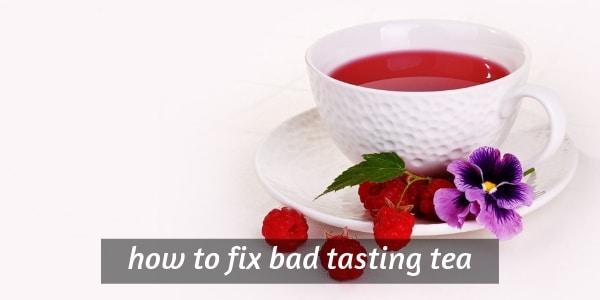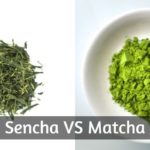Is your tea tasting weird ? There's a few things you can try to do, to enhance your tea drinking experience. Sometimes we make mistakes when brewing, and other times it's simply the tea.
This means we're going to go through all the possible fixes for teas that taste off.

Table of Contents
1. Try adjusting your brewing time
Often this is the biggest problem with tea making. When I was in college I had no real clue as to how much I should steep my tea. Then again I was using teabags 90% of the time, and often didn't even bother to remove the bag from the cup.
I know, I was a monster.
The thing with tea is that it's a very sensitive brew, and you're going to have to adjust the brewing time accordingly.
If you steep the tea for too long, you risk overextracting it. This means your tea will be bitter, and for herbal teas the taste can become vegetal and lose part of the flavor.
Wen using green tea, you should steep for 2-3 minutes.
With black tea, you should steep for 3-5 minutes.
White tea should be steeped for a minimum of one minutes, and then checked every 30 seconds until you've reached your perfect brewing time. In some cases this can take up to 10 minutes.
Herbal teas are less finicky, though they usually release all their flavor after 5 minutes. So brewing them for 10 is not necessary. Aim for 5-7 minutes.
For rooibos teas, I recommend steeping it as you would a black tea, for 3-5 minutes.
Oolong teas are best served in small amounts but with many steeps. SO steep for 5-10 seconds on the first go, then steep again with 10 seconds extra, and so on until you're done with the tea.
When brewing tea, how long to let it steep is the biggest problem because of the waiting time. We start making the tea, wait for the water to heat up, add the tea, and then stare at the cup for several minutes.
The the phone rings, or a neighbor needs something, or the kids start arguing over crayons and ponies. Something always happens when we have a few precious minutes to make tea, and we often find ourselves pulled away from the awaiting cup.
When we come back, it's been 3 minutes too long and our green tea is now a darker color and way too bitter. A shame to waste it, but also not drinkable.
So making sure we put an alarm on our phone, or a kitchen timer is going to save us much trouble. No, really.
2. Make sure your water temperature is right
Another reason, and as equally common as the brewing time problem, is the water temperature.
This is very true in homes where tea is chucked somewhere in the back of a cupboard, and only sees the light of day once a year.
In those homes, the tea is probably simmered and then served.
The problem with the water temperature is that water that's too how will scald the tea, making it bitter. It will also pretty much 'burn' much of the flavor away.
Using water that's too cool will underextract the tea, making it much too watery and bland, even not release some flavors at all.
So how hot should your tea water be, then ?
For green tea, 80 C/176 F is enough. Anything hotter will burn the tea and you won't be happy with the result. If you have no thermometer, this temperature can be reached if you bring the water to a full boil, and let it sit for about 2-3 minutes.
For black tea, 90 C/194 F is necessary. It can take water that's slightly hotter, but don't overdo it.
For white tea, you will need 75 C/167 F water and lots of patience when brewing. Keep in mind that white tea is very delicate, and you'll need to check it every few seconds to see if it's the flavor you like.
For herbal teas, please do not use boiling water. Use 90 C/194 F water, like you would for black tea. And for the love of god, do not actively boil the herbal tea for several minutes. You're ruining the flavor.
For rooibos teas, 90 C/194 F again is a good choice.
And for oolongs the same temperature is needed. Anything over that and you risk scalding the tea.
If you want to be very, very sure of what the water temp is, I suggest you get yourself a coking or water thermometer. If you drink tea occasionally, it might not matter, but if you're very much into tea, it'll help a lot.
3. Your water should be clean, possibly purified
Using clean water is another step towards making sure your tea tastes just right.
Don't get me wrong, I'm not saying your tap water is unsafe. But I am saying your tap water might not be suited for tea making.
For example hard water is going to dull the taste of your tea, and you'll notice your water is hard if you get some white residue on your glassware after allowing water droplets to dry.
Those are extra minerals and salts found in your water, and in the U.S. it's found in more than half the states. For reference, check your area's hard water info.
If your home does have hard water, that isn't an issue for health usually. But for tea making it is, and you will need purified water, or simple bottle water.
No need to buy expensive bottled water, just make sure the water you buy is pure.
But if your home has soft water, and your tea is still funny tasting, it might be because of the processing station. Most people live in urban areas, which means the water they use is a purified, sometimes recycled water.
The water is subjected to several chemical processes in some cases, like anti-bacterial treatments or removing some pesticides or other such treatments. Water isn't treated without purpose, so don't panic.
The government isn't trying to poison us.
There might be effects on the taste of the water, not harmful to living organisms but still making water taste... bland, you could say.
If that's the case with your water, then you will need to get purified water, again.
For reference, the purest water is usually found at higher altitudes, in the mountain areas, in places where there are very rocky rivers or streams.
4. Make sure the tea you use has been stored well
Another way to make sure your tea does taste great is to use tea that has been stored well. This means not using teabags that have been kept in the cupboard for 3 years.
Or loose leaf tea that has been left in a poorly closed tin for a year.
In order to retain its flavor, tea needs to be kept in a dark, dry, cool place. The sunlight needs to be kept well away from the tin, and heat sources as well.
Airflow should be non-existent (unless you've got a Pu'er) as it will allow the flavor to evaporate.
For this reason getting yourself some tea in a smaller batch might be a good idea. A pound of tea/400 gr is going to be a feat to go through, especially if you've got other teas to drink as well.
Buy in smaller batches, and make sure you keep them in very well sealed tins.
If you keep them in the kitchen, make sure they're not on a high shelf. Heat and steam rise to the ceiling and are trapped there. If you cook often and for long periods of time (over half an hour) your kitchen will not be the best place to keep the tea.
You can find way more info on how to store you tea here, and see how you can keep it fresh for longer.
It might sound like a bit of a hassle, but keeping your tea well-stored is going to help in the long run.
5. Don't drink tea after a strong-tasting food or other drinks
If you've had some very tasty food, especially with lots of onions, garlic, bell peppers, your tea might taste odd.
Remember that strong tastes, be they drink or food, will do two things:
- they'll leave a residue in your mouth, making other foods and drinks taste like them
- dull your senses, since the flavor is so intense you won't feel subtler ones as well
So if you've just had some hearty beans with smoked ham and roast potatoes as a side, don't expect even a fruity tea to taste like you remember it.
Wait at least an hour before drinking anything subtle like tea after you eat something very flavorful.
This applies to toothpaste, orange juice, coffee, and most sodas as well.
The tea will cleanse your palate, at most. It can't do much more than that, and the best candidate for such a feat is the green tea we all know and love.
Its astringent nature will cancel out many flavors and remaining tastes.
Keep this in mind when meaning to make some tea. When did you last eat ? Did you chew gum recently ?
Also remember that eating something sweet, like chocolate or a cupcake will make any tea taste as unsweet as possible. Any sugar present in your tea will be cancelled out by the one you ate before.
So wait and make sure your palate is clean, or as clean as can be.
6. Consider changing your teacup
The teacup you drink your tea from does affect the taste. In a very short explanation, thinner, smoother surfaced cups are best for drinking your tea. Or any beverage, actually.
A thin cup will be easier to drink from, since it won't spill over and around your mouth as much as a thicker one. This is why thin, place China is better for drinks than regular thick coffee mugs.
Also making sure that your cup has a nice, glazed finish will help. Very smooth surfaces offer no place for the flavor to cling to. This means that it's going to both wash beautifully, and keep no residual flavor.
But if you were to drink from a metal cup, a simple polished aluminium one, the taste would be a bit different and it could easily build up residue because of the texture of the metal.
Same goes for earthenware that's not heavily glazed.
Even if you've got a beautiful China teacup, it might be best to change it after a while. Minuscule cracks and splints will form, especially if you're not very careful with washing the cup.
Tea residue can easily build up in those small cracks, and in time you might notice some fine lines in your cup. Best to try a new one.
(If you like this article so far, you can pin it to your Pinterest board by clicking the image below. The article continues after the image.)
7. Scrub down every inch of your teaware
Another possible reason your tea tastes odd is because of your teaware, and how it's been kept. Teapots are infamous for dirty spots, and they need to be cleaned very well, with a thin long brush. After each use, yes.
Tea will build up like it's nobody's business, so it's best to get right in there and scrub everything down. The teapot, the teacups, the kettle, the water pot, everything your tea or tea water or tea leaves will come into contact with.
Using very hot water and a regular dish washing soap will do. What's important is the scrubbing motion, than anything else.
If your teaware has gone beyond saving, don't hold onto it. I has a small water pot I used both for coffee and for tea. In time it turned a tan color on the inside, from all the coffee I made along the years.
No matter how much you scrub it down, at some point it will become too grimy. Best to throw it away and get a new set, clean and fresh.
8. Steer clear of teabags and paper-based steeping methods
Now, this is a bit of a sore point for some. Tea is either loose leaf or in teabags, and how can you stay away from paper if your tea is in a bag.
Let's start slow here.
With teabags, it's important to know the quality of the paper in your tea. Too soft, or thick, and it might impart a papery taste to your drink. Unfortunately you can't really know beforehand which teas will taste bad because of the bags.
But you can avoid the store-brand ones, or the way too cheap ones, because usually very little thought is given to quality in those cases.
Silk satchels will work great here, as will nylon pyramids. They impart no funny taste to the tea since they have no flavor of their own. Those are more expensive, usually.
Finally, when dealing with loose leaf tea, you can do several things. You can use some large, empty tea bags which may or may not impart a bad flavor.
I suggest you don't.
Or you can look for teamakers which can strain the tea for you. So, this could be a French press, or a teapot with a large metal filter in the middle.
In the end, you can always use a tea ball, and in worse comes to worst, you can always just strain your tea with a regular ol' kitchen strainer.
9. Adjust the tea to water ratio
Adjusting the tea to water ratio might be another option. It could be that you're making your tea much too strong.
This can lead to slightly bitter or acidic teas, and diluting them with cold water will not help. The taste will still be off.
If you use too much water, your tea will be too watery and bland, and you won't be very happy with your cup.
I suggest to play around a bit with the water to tea ratio, and see how you can make it more pleasant for your taste.
I'm not going to give you an estimate here, since different people like their tea stronger or lighter, so you'll have to find your own balance.
A tip would be to look at your vendor's instructions, if there are any.
10. Experiment with different sweeteners or flavorings
If the taste of the tea is not to your liking, but you've brewed it perfectly then it might need a bit of sweetener or other flavors.
For example if you were to drink pure black tea, it might be too harsh or strong for your taste.
So a bit of sugar or milk would be welcome and would make things much easier.
For example I know I can't drink pure green tea, which is why I always go for a green tea that's blended with something else. A bit of mint, or lemon, or a flowery green tea are great options.
Maybe your case is the same, but with a different tea. Don't be afraid to experiment and try out new teas. Some you might like, some you might not.
But you'll never find out if you don't try.
11. Accept that this tea might not be for you
Finally, let us faces this. Maybe this tea isn't for you. Maybe you've tried every option in this article, and brewed it in every way possible. You still find something wrong with this tea.
Then it might just be the tea that's troubling you.
No worries, not all teas are for everyone.
For example I had a UTI once and had to drink very large amounts of cherry stem tea, for astringency, and dandelion tea for soothing discomfort. As in, I had no water, only tea, and had to drink lots of it in order to go to the bathroom often.
Oh boy.
To this day, I can't stand the smell of dandelion tea, no mater how efficient it is. Neither do I like cherry stem tea. I didn't even when I had to drink it, now I downright hate it.
Given my condition, sugar or sweeteners had to be kept to a minimum.
So maybe you've met a tea that's simply not for you. Some people just can't stand black tea, for example. While the brits may find that sentence very weird, I can agree with it.
Pure black tea is too much for me too, and as with green tea, I need a bit of extra flavoring to help things along.
Final thoughts
I hope you found some good ideas here on how to improve your tea drinking experience. I know tea is a very delicate drink and many things can go very wrong when we try to brew our tea.
But these fixes should be able to cover any and all problems you might encounter with your tea. If all else fails, you can always just switch teas and be done with it.
If you want to know more about coffee or tea, feel free to check the related articles below. Who knows what else you might find ?





